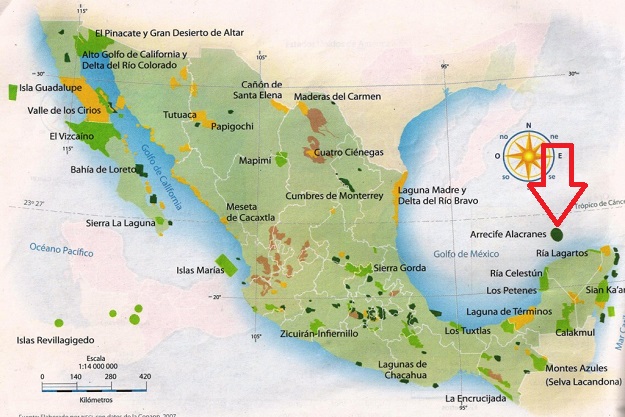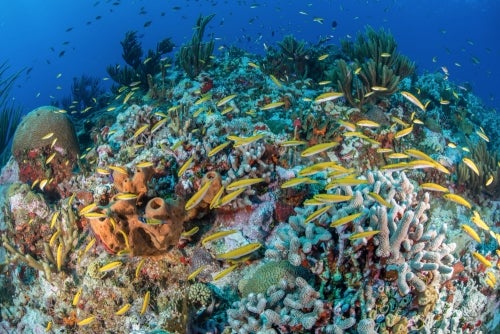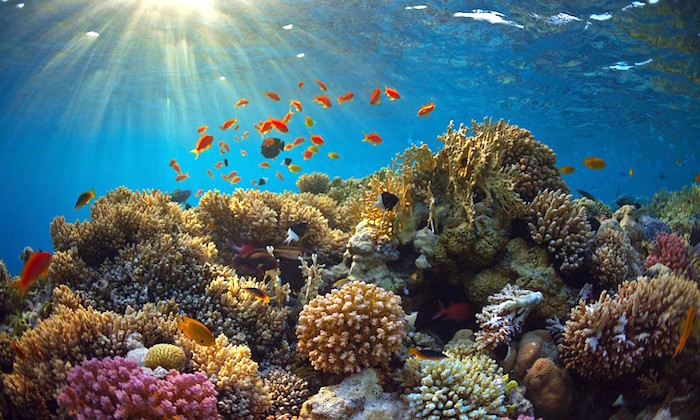Oceana inc. is a non-profit, non-governmental organization whose objective is marine conservation, through activism and scientific research.
Yucatán, (October 09, 2021).- The most important reef in the Gulf of Mexico, Arrecife Alacranes National Park, faces a series of pressures that put its future at risk. Illegal fishing and growing tourism threaten one of the richest places in the Mexican seas, Oceana warned at the conclusion of the Proyecto Alacranes expedition.
After diving into the depths of this ecosystem, Oceana, the largest international organization dedicated exclusively to the protection of the oceans, identified the death of corals called “elkhorn” (Acropora palmata), as well as a high presence of lionfish, an Invasive species. Inside the Park, the “Canal de Anegados” site was a field full of Acroporas; however, during this expedition, mortality of between 85 and 90% of these colonies was registered in the reef barrier, which represents a challenge for their conservation.
In this second phase of their expedition, Oceana scientists photographed eight sites, divided into four zones, with high-definition cameras. “The main objective is to generate 3D maps to obtain an accurate image of the corals, and thus to know the current state of the reef in order to propose changes in public policy that favor their conservation. This technology is innovative in our country, and it will give us fundamental information on the health of all the biodiversity that lives there ”, explained Mariana Reyna, leader of the expedition

The Alacranes Reef, located off the coast of Yucatán, is subject to different pressures due to environmental factors, illegal fishing and the lack of regulations that require coordination between the authorities in charge of protecting this natural heritage. In a complementary investigation, using the satellite monitoring platform for fishing vessels, Global Fishing Watch, Oceana identified 68 vessels carrying out possible fishing activities in the core zone of this Marine Protected Area (MPA), where no type of fishing is allowed.
Between 2012 and 2019, these vessels registered 857 possible fishing activities in prohibited areas. 39% of them (23 of the 68 boats) returned to port and reported fishing for product, confirming that they carried out these activities in prohibited areas. Their routes coincide with places where there are species of commercial interest such as sea cucumber, lobster and queen conch.
“Illegal fishing is one of the greatest threats to our seas, because it prevents the protection area from doing its recovery work,” said Miguel Rivas, Habitat’s campaign director in Oceana, “If important species are not allowed to fisheries develop, we can overexploit the resources on which the income of thousands of families who are dedicated to fishing depends ”.
The importance of this reef lies in the fact that it is an area destined to the conservation of marine flora and fauna. Some of these species have a protection category, such as hawksbill, leatherback, and loggerhead turtles, all of them under a threatened or endangered category.
In this National Park there are also commercial species that need these sites to grow and reproduce. Keeping fishing out of these marine sanctuaries ensures that fishery resources are not depleted, and that communities can continue to harness them. The research carried out at the Alacranes Project will make it possible to assess whether the current restrictions on fishing are sufficient to guarantee the good condition of the populations of marine fauna, or whether it is necessary to change the perimeters of the protected areas within the Park.

(Photo credit: Rodrigo Friscione)
“Protecting these sites is protecting marine life. Reefs are seedbeds from which the wealth of the seas springs, and that is why there are legal figures to conserve them. However, without effective surveillance we do not guarantee their resilience to the global pressures that affect them, and we put at risk the income of at least 4, 300 families that depend on fishing in Progreso, Yucatán, ”added Miguel Rivas.
Regarding tourism, Oceana points out that since 2015 these activities have increased significantly; In 2018 alone, 6,737 tourists were registered; that is, 217 people per day, an amount that exceeds the limit established for its conservation. In 2019 tourism had a slight decrease, and a year later, only due to the contingency caused by COVID-19, the upward flow of tourists was cut off.
Habitat’s campaign director pointed out that these findings expose the importance of the National Commission for Protected Natural Areas (CONANP) having the necessary resources for its conservation efforts. “Although the scientific evidence that was collected remains to be processed, both in Bajos Norte and Alacranes, these reefs tend to recover favorably if their stressors such as uncontrolled tourism or unsustainable fishing are reduced. We are in time to rescue these sites and ensure their future ”, added the scientist.

They ask the authorities for urgent action
Following the conclusion of the Proyecto Alacranes expedition, Oceana makes the following recommendations to the Mexican authorities:
- Enforce the ban on fishing in the core areas of Alacranes and protect the reefs of Bajos del Norte.
- Greater coordination, communication and linkage between the responsible authorities to prevent illegal fishing in areas where it is not allowed.
- Strengthen the inspection and surveillance of the seas with the use of satellite monitoring, and make this information transparent through Global Fishing Watch.
Project Alacranes had the support of Blancpain, which has a legacy of exploration and protection of the oceans for 70 years, and thanks to its commitment to the seas it was possible to obtain these preliminary results that, after their analysis, will provide more accurate information. on the health status of this important ecosystem for Mexico and the world.
TYT Newsroom




